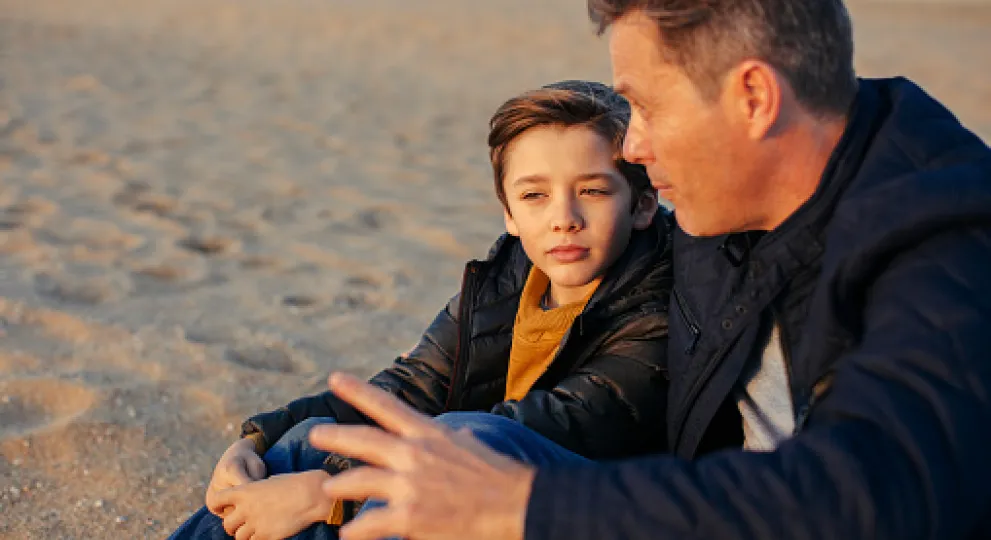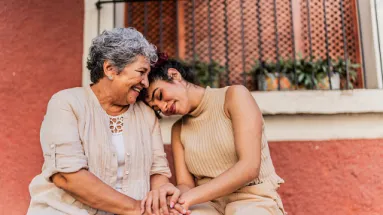How to talk to your kids about cancer
How to talk to your kids about cancer

Parenthood adds an extra layer of complexity to living with cancer. What should you tell your children? When should you tell them? Should you shield them or be direct?
Since every cancer journey — and every family — is different, there’s no easy answer to these questions. But how you communicate with your children can be an important part of helping them understand and adjust to having a parent living with cancer.
“Children pick up on more than people realize — and can sometimes imagine things to be even worse than they are,” Dr. Claire McCarthy, a pediatrician and professor of pediatrics at Harvard Medical School, wrote for Harvard Health Publishing. “Also, it's important to help children gain the understanding and skills they need to weather a loved one's illness, as well as to weather the inevitable difficult times in their future.”
Here are some factors to consider when talking with your children about cancer.
Talking to your children soon after your diagnosis
Finding a way to talk to your kids sooner rather than later can be important — even if it’s hard.
“The worst thing that can happen is that a kid finds out about their parent's illness from somebody else," Elizabeth Farrell, a clinical social worker with the Dana-Farber Cancer Institute, told NPR.
Your conversations may be difficult and emotional, and that’s OK. In fact, expressing your feelings may help your children process their own emotions and may give them permission to feel their own emotions. They might have feelings of sadness, anger, and confusion, to name a few.
"Kids need to know it's OK to have those feelings, that this is a hard situation,” Farrell said.
Listening and leaving space for questions
While talking to children, you may want to let them know it’s okay to feel scared or confused. After you’ve explained the situation, you can give your child space to ask questions. They may have immediate concerns, or they may need time to process the information. Let them know it’s okay to ask anything, even if they think their questions are silly or scary.
Considering the child’s age
Of course, how and what you communicate may depend on the child’s age. Younger children may need simple explanations, while teenagers might need more detailed information to feel reassured. If you’re not sure where your child might be in their development, you may choose to discuss it with your pediatrician.
One thing to be aware of, especially with older children, is the potential for role reversal: when a child feels an urge to step into the role of caregiver. They may feel burdened by the practical and mental load, even if they don’t admit it. So you may want to remind older children that they are still cared for and allowed to be kids.
Being honest
You may feel inclined to protect your children from details of your diagnosis. But being honest with them in an age-appropriate way can help them process the situation. They are on this journey with you, and being direct with them about your cancer, and how it might affect your family’s life and routines, may help them navigate the journey with more resilience.
“That doesn't mean going into every gory detail,” Dr. Claire McCarthy wrote. “That's rarely helpful. But it does mean that if the illness is serious, you should say so. Let them know what may happen next, such as if the person might lose their hair from chemotherapy.”
Consider using specific words relating to your cancer journey — even though your instinct might be to shield children from specifics.
As Elizabeth Farrell, of the Dana-Farber Cancer Institute, said, "Use the word 'cancer.’ Be really clear — if you're going to get chemotherapy, then it's 'chemotherapy,' 'surgery,' et cetera."
An opportunity for togetherness
For all its many challenges, living with cancer may present an opportunity to deepen family ties.
“Many patients report that positive things emerge from coping with cancer together as a family,” Cindy Moore, PhD, director of the Marjorie E. Korff PACT (Parenting At a Challenging Time) Program at Mass General Cancer Center, which provides support for parents with cancer, told the Center’s news service. “When children go through a hard situation with people who care about them, it builds resilience and helps them grow. When you’re lovingly attuned to children’s experiences and actively supporting them, they can get through very difficult things.”
Here are some Microsteps to consider that may help you talk to your kids about cancer. As always, consult with your care team for the guidance and recommendations that are best for you.
Acknowledging emotions your child might feel about your cancer, and letting them know you have feelings too.
Let your child know it’s okay to feel scared, sad, or mad about the situation. Normalize these feelings and let them know if you feel them too.
Describing your treatment and side effects to help your children understand how cancer affects you and your whole family.
In an age-appropriate way, explain that you will need medicine like chemotherapy to help you fight the cancer. Having this medicine might make you feel tired or cause hair loss or other physical changes.
Explaining that cancer isn’t your child’s fault.
Keep in mind that your child may have fears or assumptions about cancer, and that you may be able to help inform and comfort them by sharing information. It might be helpful to let your child know that they didn’t cause your illness.
Reading books about cancer with your children.
There are many books that help children of different ages learn about cancer, as well as books that help teach them to name and explore their feelings. After talking to your child, consider reading a book together or giving them an opportunity to read and learn independently. Plus, doing it together is a simple way to get quality time one-on-one.
Telling your children they can ask questions any time, even if they’re not sure what to ask now.
Your children may want to talk or ask questions at random times, like in the middle of soccer practice or while grocery shopping. Try to be available to talk at these times when they’re ready – even if they’re not the exact moments you would choose.
Starting a family journal to document your shared cancer journey.
This can be a place to document experiences, both good and challenging, during the cancer journey. Journalling can help you remember, and celebrate, your small wins along the way. With young children, consider using crafts or games to help them express their feelings, like encouraging them to draw a picture of how they’re feeling.
Developed with Thrive Global













